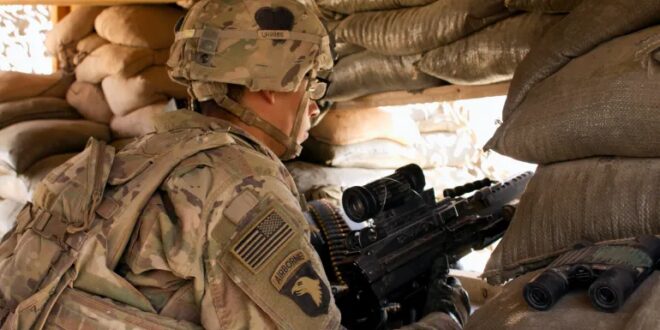The United States will continue to provide assistance, advice and training to Iraqi forces, Iraqi and US officials say.
United States-led forces have ended their combat mission in Iraq, senior US and Iraqi officials said, as the coalition transitions to an advisory role assisting Iraqi forces.
Qassim al-Araji, Iraq’s national security adviser, said on Thursday that a final round of technical talks to formally end the US-led combat mission, which was tasked with rooting out ISIL (ISIS) in the country, had concluded.
“We are officially announcing the end of the coalition forces’ combat mission,” al-Araji wrote on Twitter, adding that the coalition would continue providing assistance, advice and training to Iraqi forces.
Iraqi Kurdish Peshmerga Brigadier General Hazhar Ismail, who attended the meeting in Baghdad, also told reporters the US-led coalition said it was ready to end the mission sooner than the previous deadline. “They said we are ready starting from today,” he said.
The announcement reaffirms a July decision by the administration of US President Joe Biden to end the coalition’s combat mission in Iraq by December 31.
There are about 2,500 US soldiers and another 1,000 coalition troopers currently based in Iraq. It is unclear how many will remain in the next phase of assistance to Iraqi forces.
“Many brave men and women gave their lives to ensure Daesh never returns, and as we complete our combat role, we will remain here to advise, assist and enable [Iraqi security forces], at the invitation of Republic of Iraq,” said coalition commander Major General John Brennan, referring to ISIL (ISIS) by its Arabic acronym.
But the war against the group is not over, Brennan added. “Daesh is down, but not out.”
The formal end of the combat mission is unlikely to change the facts on the ground; the coalition stopped engaging in combat missions early in 2020, and since then, the main US focus has been assisting Iraqi forces.
Iraqi Staff Lieutenant General Abdul Amir al-Shammari, deputy commander of the Joint Operations Command for Iraq, said Iraqi forces were ready to take up the fight against ISIL. “Our soldiers have demonstrated their ability to maintain the defeat of Daesh, and we look toward the future with hope, providing stability, security, and prosperity for the men and women of Iraq,” he said.
History of intervention
The US invaded Iraq in 2003 amid its global “war on terror”, reaching a peak of about 170,000 soldiers in the country in 2007 before withdrawing forces in 2011.
US forces were redeployed to Iraq in 2014 in response to the rise of ISIL, as the armed group overran a large swath of territory across Iraq and Syria.
However, US troops have largely been acting as advisers and trainers since mid-2020, when they stopped directly engaging in combat operations. Another 900 US troops remain in Syria, although their withdrawal is not expected any time soon.
ISIL lost its last piece of territory in Iraq in 2017 and in Syria in 2019, although there has been an uptick in attacks, including in Iraq’s northern semi-autonomous Kurdish region, in recent months.
Iraqi security forces still require coalition air support in their anti-ISIL operations and for intelligence gathering, according to Iraqi and Kurdish security officials. They also need assistance maintaining US-provided weaponry and equipment.
The withdrawal follows a years-long campaign by Iran-aligned Shia factions in the Iraqi parliament and influential Iran-aligned armed groups that partially make up the Popular Mobilisation Forces (PMF) – an array of groups that fall under the auspices of the Iraqi government but operate separately from the country’s armed forces.
They have increasingly called for a reduced role for the US military in the country.
On social networks, groups close to pro-Iranian factions have been issuing threats and reminding Washington of its December 31 deadline.
In recent months, dozens of rocket and drone attacks have targeted US troops and interests in Iraq. Rarely claimed, the US systematically blames the attacks on pro-Iranian Iraqi factions.
 Eurasia Press & News
Eurasia Press & News



